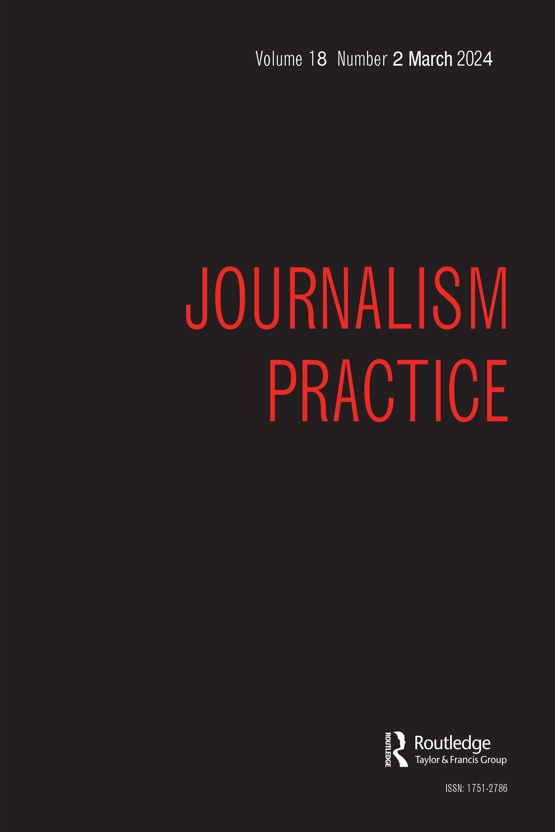Submit a Manuscript to the Journal
Journalism Practice
For a Special Issue on
Investigative Journalism in the networked age
Abstract deadline
15 October 2023
Manuscript deadline
15 June 2024

Special Issue Editor(s)
Carolyne Lunga,
University of Doha and University of Portsmouth
[email protected]
Maria Konow-Lund,
OsloMet University
[email protected]
Paul Lashmar,
City, University of London
[email protected]
Gerry Lanosga,
Indiana University
[email protected]
Investigative Journalism in the networked age
Journalism Practice invites authors to submit papers for a Special Issue on ‘Investigative Journalism in the networked age’. Investigative journalism is undergoing transformation due to various political, economic, social, and technological factors. These changes present new opportunities and challenges to those determined to hold power to uncover truth in the public interest. Journalists are forming networks with various actors across the world. These networks take on different forms, utilise technology differently and report on wrongdoing in multiple ways. Collaborations, alliances, or partnerships as they are variously called in different places in the Global North and South have thus become common globally and are considered to have benefits and challenges to those involved in them. The rise of massive data leaks is another reason why journalists and non-journalistic actors such as programmers, data specialists and money laundering experts among others are coming together to share skills and expertise. The entrance of these new actors may have an impact on traditional journalistic norms and values and may blur the lines between journalists and non-journalists. The rise of disinformation, popular news and declining trust in the media creates a hunger for more credible journalism.
More recently, award winning investigative online newspapers with a reputation for holding power to account are shutting down due to viability problems caused by ever-shrinking budgets amidst the cost-of-living crises and high inflationary environments worldwide. Politicians, businesspeople, and large foundations are buying out media thereby crippling journalism’s role of performing the watchdog role effectively. Tighter regulatory frameworks and restrictions on freedom of speech offline and online are making it harder for journalists to perform their roles particularly under authoritarian environments. Meanwhile there are growing concerns that investigative reports published behind paywalls continue to be inaccessible to ordinary citizens who cannot afford to pay for this kind of journalism thus being deprived of the opportunity to make informed decisions and engage in debate on issues of democratic governance.
In the last decade, research on investigative journalism has become important among scholars in the Global North and South providing a more thorough understanding of the changing actors, practices, and tools. Rapidly changing technology, rising disinformation, declining funding, security, threats on journalists and political challenges have made the profession more challenging than ever. Despite these challenges, journalists are finding new ways to navigate the problems to produce credible stories and taking advantage of artificial intelligence and grant funding to continue to hold power to account.
The special issue explores the influences on investigative journalism, threats to investigative journalism, new techniques and tools including the adoption of artificial intelligence and new funding and collaboration/networking models. We welcome empirical and theoretical submissions that contribute to the further development of this research area. Contributions to this special issue may employ different methodological and theoretical approaches and study investigative journalism practice from different levels of analysis. Cross-disciplinary approaches are encouraged. The special issue aims to bring together innovative, thought-provoking contributions from the Global North and South exploring a range of topics including:
- Changing practices of investigative journalism
- Investigative journalism and technology: How technology and AI are changing the news gathering, production and dissemination processes of investigative journalism.
- What political, social, and economic factors shape the practice of investigative journalism
- Impact of disinformation and misinformation on investigative journalism
- Political, economic, social, and technological challenges that impact on the practice of investigative journalism
- New models of collaboration, partnerships, or alliances
- Strategic Lawsuits Against Public Participation (SLAPPS)
- Unpacking new networks in investigative journalism
- Investigative journalism and the climate crisis
- New actors in investigative journalism and impact on the journalistic norms and values
- Non-profit driven investigative journalism
- Security threats and challenges on investigative journalism
- Whistleblowing and investigative journalism
- Big Data and investigative journalism
- Challenges of doing investigative journalism
- Regulatory frameworks and investigative journalism
- Comparative cases studies of investigative journalism
- Investigative journalism in democracies and authoritarian regimes
Looking to Publish your Research?
Find out how to publish your research open access with Taylor & Francis Group.
Choose open accessSubmission Instructions
This is a call for extended abstracts (500-750 words), accompanied by a 100-150-word bio introducing your relevant expertise. Abstracts should be sent no later than October 15, to [email protected]; [email protected]; [email protected] and [email protected]. Upon selection, scholars will be invited to submit full papers. Article submissions should be about 8,000 words in length, including references, and are subject to full blind peer-review, in accordance with the peer-review procedure of Journalism Practice. Manuscripts will be submitted through the journal’s ScholarOne website. Authors must indicate that they wish to have their manuscript considered for this Special Issue.
Timeline
Deadline submission of extended abstracts: October 15, 2023
Decision on abstracts: December 15, 2023
Deadline for full-papers submission: June 15, 2024.
Publication: Online first after acceptance, and later in a forthcoming issue of Journalism Practice.